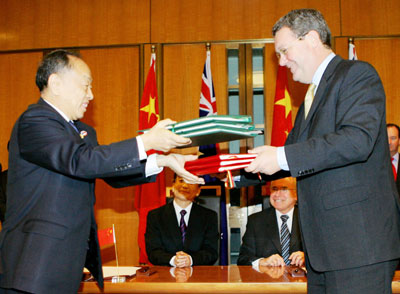|
China, Australia ink uranium trade deal
(Reuters)
Updated: 2006-04-03 09:11
Australia and China signed a nuclear safeguards deal on Monday to allow
Beijing to import Australian uranium for power generation, but an Australian
minister said exports were unlikely to start for some years.

Chinese Premier Wen
Jiabao (back L) and Australian Prime Minister John Howard (back R) watch
foreign ministers Li Zhaoxing (L) from China and Alexander Downer from
Australia exchange the Nuclear Safeguard Agreement during a signing
ceremony in Canberra's Parliament House April 3, 2006.
[Reuters] |
The deal was signed in the presence of visiting Chinese Premier Wen
Jiabao and Australian Prime Minister John Howard.
China is expected to
build 40 to 50 nuclear power plants over the next 20 years and needs steady
supplies of uranium.
Australia has about 40 percent of the world's known
uranium reserves, but it only allows sales to countries which have signed the
Nuclear Non-Proliferation Treaty (NPT) who also agree to a separate bilateral
safeguards deal.
But it has only three operating uranium mines, owned by
BHP Billiton, Rio Tinto and General Atomics of the United States, and Resources
Minister Ian Macfarlane said big uranium exports to China were unlikely to start
until 2010.
"Australia is already fully committed in terms of uranium
production through until about 2008, bearing in mind that the signing of this
agreement means that this is really only the start of the process," Macfarlane
told Australian radio.
He said once the safeguards deal was signed,
China would then need to begin commercial negotiations with uranium producers in
Australia, and new mines would probably need to be developed that would require
licensing by the government.
"Realistically in terms of any significant
quantity we are probably looking at some time past 2010," said Macfarlane, who
met Wen in the Western Australian state capital Perth on Sunday.
Some
analysts have said the safeguards deal between Australia and China, which are
also negotiating a free trade deal, will test Canberra's skills at juggling
growing ties with Asia's emerging power and its strong alliance with the United
States.
Australia has 19 bilateral nuclear safeguard agreements,
covering 36 countries, including the United States, France, Britain, Mexico,
Japan, Finland and South Korea.
The NPT obligates the five nuclear-weapon
states -- the United States, Russia, United Kingdom, France, and China -- not to
transfer nuclear weapons, other nuclear explosive devices, or technology to
non-nuclear-weapon states and those which haven't signed the
treaty.
|
| |
|
| |